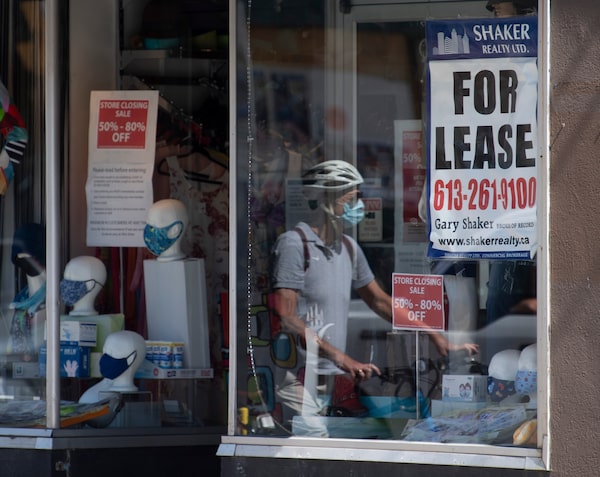
A lease sign hangs in the window as a cyclist walks past a commercial store on Aug. 31, 2020 in Ottawa.Adrian Wyld/The Canadian Press
The federal government’s new commercial rent subsidy has hit a stumbling block as Ottawa tries to fix a requirement that would force entrepreneurs to pay rent before receiving funding, despite their diminished pandemic revenues.
Finance Minister Chrystia Freeland introduced the Canada Emergency Rent Subsidy (CERS) program last month after winding down its widely criticized predecessor, the Canada Emergency Commercial Rent Assistance program. The earlier program was marred by delays and required landlords to apply on behalf of their business tenants, prompting low uptake among eligible entrepreneurs.
The restructured CERS program was welcomed by many entrepreneurs for letting tenants apply directly, but it has since faced its own set of delays. The minority Liberals only tabled Bill C-9 to send CERS into law last week, as entrepreneurs entered their second month without any federal rent relief at all. On Friday, the program hit a new snag, when an amendment to the bill to let businesses access the subsidy before they pay rent was dismissed before it was passed – leaving its fate with the Senate.
If the bill is left unchanged, thousands of entrepreneurs across the country would be forced to cobble together rent funds before applying for the subsidy retroactively, threatening their livelihoods after nearly eight months of plunging revenues because of pandemic lockdowns and safety requirements.
“It’s a major goof-up by Chrystia Freeland,” Pierre Poilievre, the Conservative finance critic, said in an interview Sunday. “She produced something with a massive design flaw that will render the program completely useless to the people who need it most. When she realized her mistake, she goofed up the procedural fix and couldn’t even amend her own legislation. The irony is this is a program for businesses that can’t afford their rent – yet it asks those same businesses to pay their rent and ask the government for a reimbursement afterwards."
The problem was revealed Thursday morning when Dan Kelly, who leads the Canadian Federation of Independent Business (CFIB), posted a series of tweets arguing that the bill’s language could force businesses to pay rent before accessing the subsidy.
“I’m worried a requirement to demonstrate pre-payment of rent in order to apply for the subsidy will put the program out of reach for some due to the lack of cash flow,” Mr. Kelly wrote.
When The Globe and Mail asked Ms. Freeland’s office on Thursday whether this interpretation was correct, a spokesperson did not confirm it was until 24 hours later. The spokesperson then pointed to an amendment Ms. Freeland had made on Thursday evening, to let entrepreneurs access the subsidy before paying rent, provided they attest that they intend to pay the rent expenses in the next 60 days.
On Friday, however, the bill hit another snag, when Deputy Speaker Bruce Stanton told the House of Commons that Ms. Freeland’s amendment could not be considered because of a procedural issue – it was the wrong stage of the process for an amendment that could require additional public spending.
The government has said that the CERS program was designed to align with the Canada Emergency Wage Subsidy, which administers funding retroactively. A spokesperson for Ms. Freeland said that the ministry made the amendment after it became aware of concerns such as Mr. Kelly’s.
“Our government has constantly re-evaluated our programs and support for Canadians in response to the changing economic and health situation, and to reflect feedback from businesses and workers,” Katherine Cuplinskas, Ms. Freeland’s spokesperson, said in an e-mail. “The amendment put forward by the government ... responded to the concerns of small business owners by modifying the rent definition to include rent payable."
In an interview Sunday, Mr. Kelly said that he’d spoken with Ms. Freeland’s team after his tweets and appreciated that they made the amendment.
“I hope it’s not going to cause any delay for the subsidy to be implemented,” Mr. Kelly said.
The bill now faces the Senate, which can make amendments if the House of Commons agrees with them. Ms. Freeland’s office did not provide any details about the government’s strategy to address the unchanged problem with the rent subsidy when asked on Sunday. But the procedural error prompted fast criticism from opposition MPs, including Mr. Poilievre.
The NDP had asked for its own amendment last week to make the program retroactive to April 1, as many small businesses were unable to access the original rent program because their landlords chose not to apply.
“We appreciate the Liberals making this a tenant-driven program, but why would they not backdate it for the six months to allow those who were excluded from the design-flawed program to apply to get the support?” Gord Johns, the party’s small-business critic, asked in the House on Friday. CFIB is seeking similar retroactive measures.
The original rent program expired at the end of September, and though the new CERS program is set to be retroactive to Sept. 27, no application date has been set as it winds its way through Parliament.
CERS allows entrepreneurs to apply to the Canada Revenue Agency for grants to help with rent or mortgage interest expenses, with a sliding scale of funding available depending on the extent of their revenue loss.
Your time is valuable. Have the Top Business Headlines newsletter conveniently delivered to your inbox in the morning or evening. Sign up today.